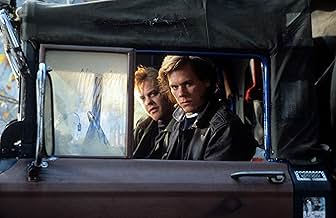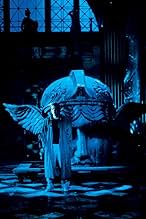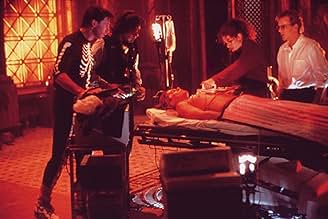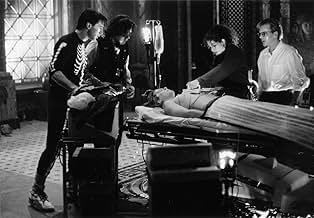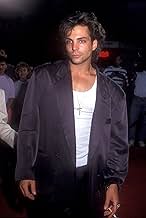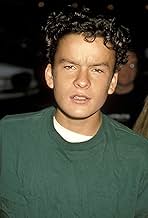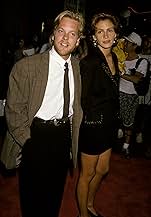Vier Medizinstudenten experimentieren mit "Nahtod"-Erfahrungen, bei denen sie mit tragischen Ereignissen aus der Vergangenheit konfrontiert werden, die auf gefährliche Weise beginnen, ihr Le... Alles lesenVier Medizinstudenten experimentieren mit "Nahtod"-Erfahrungen, bei denen sie mit tragischen Ereignissen aus der Vergangenheit konfrontiert werden, die auf gefährliche Weise beginnen, ihr Leben zu beeinflussen.Vier Medizinstudenten experimentieren mit "Nahtod"-Erfahrungen, bei denen sie mit tragischen Ereignissen aus der Vergangenheit konfrontiert werden, die auf gefährliche Weise beginnen, ihr Leben zu beeinflussen.
- Für 1 Oscar nominiert
- 3 Nominierungen insgesamt
John Duda
- Young Labraccio
- (as John Joseph Duda)
Empfohlene Bewertungen
The basic premise of Flatliners is fairly simple. Several medical students put themselves at the point of death in order to find out exactly what the brain does during the fact. It sounds like something a mob of bored students would do for a joke, but it forms the basis of some very creepy substories. In today's world, where Hollywood has to mine foreign markets for the ideas to make a horror film, Flatliners is one of those rare gems that show Hollywood can make something different when it tries hard enough.
What separates Flatliners from a lot of films based on this premise that would come out today is that it does not stoop to being condescending or arrogant. Flatliners recognises that people go to films to be entertained, not moralised to. In this kind of supernatural thriller, the difference this restraint makes is really incredible. What's even more incredible is that Julia Roberts appears without being annoying or demonstrating that she can only play Julia Roberts. The theory of obscurity, that performing artists do their best work with the smallest audience, is in force here.
The subplots concerning what the characters find during their loss of pretty much everything that makes them alive, and how it comes back to intrude on their present time, are done surprisingly well. The moments when William Baldwin's character finds his personal videotape collection coming back to haunt him are especially intriguing. That William Baldwin seems so perfectly cast in the role says a lot either about the script or the direction. I am not sure which.
Kiefer Sutherland, on the other hand, really shines as the lead. One really feels for him as the mystery of what past experience is intruding on the present and why unfolds. As Kevin Bacon's character goes to find an old school pier whose life he made hell and tell her how sorry he is, it becomes clearer what the film is about. We can try to change the past as much as we like, but it's what we do with the present that matters most.
Another good aspect of Flatliners is how it achieves an atmosphere without the use of expensive, elaborate visual effects. Quite unusually for what is essentially a horror film, Flatliners did not expend its budget in places where it did not need to. Much of what we see during the more surreal sequences is a case of professional pretending, simple trick photography, or stock footage. Sometimes the simplest things are the best.
If there is a problem with the film, it's that it feels about ten minutes too short. The ending seems more perfunctory than conclusive, as if someone in the studio asked the director to wrap the film up so they can bring it out at a certain market time. Of course, many films have been left with sore spots for this very reason, so Flatliners shouldn't really need to be any different. The hundred and fifteen minutes we do get is highly satisfactory, though not overly brilliant.
I gave Flatliners a seven out of ten. It works well as a date flick or a kind of late-night popcorn film. That aside, it makes a good reminder that low-budget horror shows weren't always sad pieces of garbage.
What separates Flatliners from a lot of films based on this premise that would come out today is that it does not stoop to being condescending or arrogant. Flatliners recognises that people go to films to be entertained, not moralised to. In this kind of supernatural thriller, the difference this restraint makes is really incredible. What's even more incredible is that Julia Roberts appears without being annoying or demonstrating that she can only play Julia Roberts. The theory of obscurity, that performing artists do their best work with the smallest audience, is in force here.
The subplots concerning what the characters find during their loss of pretty much everything that makes them alive, and how it comes back to intrude on their present time, are done surprisingly well. The moments when William Baldwin's character finds his personal videotape collection coming back to haunt him are especially intriguing. That William Baldwin seems so perfectly cast in the role says a lot either about the script or the direction. I am not sure which.
Kiefer Sutherland, on the other hand, really shines as the lead. One really feels for him as the mystery of what past experience is intruding on the present and why unfolds. As Kevin Bacon's character goes to find an old school pier whose life he made hell and tell her how sorry he is, it becomes clearer what the film is about. We can try to change the past as much as we like, but it's what we do with the present that matters most.
Another good aspect of Flatliners is how it achieves an atmosphere without the use of expensive, elaborate visual effects. Quite unusually for what is essentially a horror film, Flatliners did not expend its budget in places where it did not need to. Much of what we see during the more surreal sequences is a case of professional pretending, simple trick photography, or stock footage. Sometimes the simplest things are the best.
If there is a problem with the film, it's that it feels about ten minutes too short. The ending seems more perfunctory than conclusive, as if someone in the studio asked the director to wrap the film up so they can bring it out at a certain market time. Of course, many films have been left with sore spots for this very reason, so Flatliners shouldn't really need to be any different. The hundred and fifteen minutes we do get is highly satisfactory, though not overly brilliant.
I gave Flatliners a seven out of ten. It works well as a date flick or a kind of late-night popcorn film. That aside, it makes a good reminder that low-budget horror shows weren't always sad pieces of garbage.
When I first watched Flatliners, I was amazed. It had all the necessary features of a good movie: the cast was superb, the plot was superb, and in the case of thrillers, there was genuine "thrills" throughout.
Keifer Sutherland offered a marvelous performance as the male lead in the piece, portraying a scientist who believes he can find the answers to life and death by killing himself and then coming back to life, essentially "stealing" death's secrets away. Kevin Bacon offers an excellent performance as the more morally decent counterpart to Keifer, while Julia Roberts offers her most convincing role. William Baldwin portrays a student who excels in class and, apparently, intercourse. And Oliver Platt, in another outstanding performance, portrays the voice of reason for the group and the most innocent.
The story is relatively simple, yet original, and the acting is refreshing-- definitely a stand out film for the genre, and one that has set the standard for measuring other thrillers for me.
8/10.
Keifer Sutherland offered a marvelous performance as the male lead in the piece, portraying a scientist who believes he can find the answers to life and death by killing himself and then coming back to life, essentially "stealing" death's secrets away. Kevin Bacon offers an excellent performance as the more morally decent counterpart to Keifer, while Julia Roberts offers her most convincing role. William Baldwin portrays a student who excels in class and, apparently, intercourse. And Oliver Platt, in another outstanding performance, portrays the voice of reason for the group and the most innocent.
The story is relatively simple, yet original, and the acting is refreshing-- definitely a stand out film for the genre, and one that has set the standard for measuring other thrillers for me.
8/10.
Countless TV displays and the memorable appearances from 4 of today's mega-stars(plus Hope Davis's screen debut) keep Flatliners still in prudence. The plot is about a non-academic research of five medicine undergrads pursuing one's crazy idea on discovering the secret of death, and learn what's after death, then come back to life again. Yet the storyline hasn't been designed as fascinating as the idea of the plot.
There are popular stereotypes to develop a regular teen-slasher script in Flatliners. There is Nelson who creates the idea of decoding death, pretty but introverted Rachel, David who cuts the Gordian knot on luckily not to be dismissed from the school, ladies' man Joe and finally the smart guy Randy("I did not come to medical school to murder my class mates no matter how deranged they might be"). They join hands altogether in an experiment where Nelson's heart will be stopped and rerythmed. Then they decide to continue this experiment in strict confidence at night times in the campus. Not long after Nelson's experience everyone starts a race over having the wildest and the longest death experience, risking their lives one by one. Yet, soon they realize their daily life becomes affected from those experiences they had. The visits to the afterlife brings back their delinquent feelings from their childhood memories. Depolarizing their deep subconscious watchfulness, they begin having somatic delusions and visual hallucinations.
When the point comes where the explanation of subconscious, director Joel Schumacher skips that every humankind has a subconscious personality which they are not aware of. This inner personality keeps one from altering into identity loss. If you lose or if you depolarize this subconscious personality you certainly lose your identity instead of refreshing childhood memories. I wanted to add this as a movie mistake, which already has been mentioned via movie critics in the earlier 90s'. Obviously here in this movie Schumacher made the actors have it least affected. Then why do they hesitate continuing on the experiment after learning their lesson, as if death is designed indiscoverable by God? David had been introduced as an Atheist, now he turned out to believe in God when he recalled a flashback from his childhood. After witnessing this 180 degreed change in David, it's clear to see that Schumacher's film was so conservative and lily-livered; that's ultimately why it's never classified as a work of science fiction. Alas! It had a good potential. It even tried to tell the unconscious maturation from having a death experience, beginning to believe that death is so simply natural and it's only a part of a human's life.
More than what's in the movie, it was also memorable to recall what's with the movie. Jan de Bont as the cinematographer, who had worked almost every time with Schumacher, creates an dreamy atmosphere like it's being an Gothic horror movie. The blue color schemes all over the walls reflecting into the actors' faces deliver first class of lighting, that suits perfectly with the film. The close-up shots of the gargoyle statues in the campus buildings, Catholic frescoes in the walls, stop-motion cameras, and the dynamic camera speeds were all belong to Bont's skills.
Flatliners became a cult movie in time with its sociological pen-portrait of the X-generation juvenile especially via its futuristic editing style with storyboard connection sequences like being part of a video music clip so much aesthetically. Those were the times where fast-paced and multi-sequenced video music clips were on rise. This style was very rare to come across in those years after its pioneer Tony Scott's "The Hunger(1983)".
There are popular stereotypes to develop a regular teen-slasher script in Flatliners. There is Nelson who creates the idea of decoding death, pretty but introverted Rachel, David who cuts the Gordian knot on luckily not to be dismissed from the school, ladies' man Joe and finally the smart guy Randy("I did not come to medical school to murder my class mates no matter how deranged they might be"). They join hands altogether in an experiment where Nelson's heart will be stopped and rerythmed. Then they decide to continue this experiment in strict confidence at night times in the campus. Not long after Nelson's experience everyone starts a race over having the wildest and the longest death experience, risking their lives one by one. Yet, soon they realize their daily life becomes affected from those experiences they had. The visits to the afterlife brings back their delinquent feelings from their childhood memories. Depolarizing their deep subconscious watchfulness, they begin having somatic delusions and visual hallucinations.
When the point comes where the explanation of subconscious, director Joel Schumacher skips that every humankind has a subconscious personality which they are not aware of. This inner personality keeps one from altering into identity loss. If you lose or if you depolarize this subconscious personality you certainly lose your identity instead of refreshing childhood memories. I wanted to add this as a movie mistake, which already has been mentioned via movie critics in the earlier 90s'. Obviously here in this movie Schumacher made the actors have it least affected. Then why do they hesitate continuing on the experiment after learning their lesson, as if death is designed indiscoverable by God? David had been introduced as an Atheist, now he turned out to believe in God when he recalled a flashback from his childhood. After witnessing this 180 degreed change in David, it's clear to see that Schumacher's film was so conservative and lily-livered; that's ultimately why it's never classified as a work of science fiction. Alas! It had a good potential. It even tried to tell the unconscious maturation from having a death experience, beginning to believe that death is so simply natural and it's only a part of a human's life.
More than what's in the movie, it was also memorable to recall what's with the movie. Jan de Bont as the cinematographer, who had worked almost every time with Schumacher, creates an dreamy atmosphere like it's being an Gothic horror movie. The blue color schemes all over the walls reflecting into the actors' faces deliver first class of lighting, that suits perfectly with the film. The close-up shots of the gargoyle statues in the campus buildings, Catholic frescoes in the walls, stop-motion cameras, and the dynamic camera speeds were all belong to Bont's skills.
Flatliners became a cult movie in time with its sociological pen-portrait of the X-generation juvenile especially via its futuristic editing style with storyboard connection sequences like being part of a video music clip so much aesthetically. Those were the times where fast-paced and multi-sequenced video music clips were on rise. This style was very rare to come across in those years after its pioneer Tony Scott's "The Hunger(1983)".
The medical student Nelson Wright (Kiefer Sutherland) invites Joe Hurley (William Baldwin), David Labraccio (Kevin Bacon), Rachel Mannus (Julia Roberts) and Randy Steckle (Oliver Platt), who are friends from his class, to participate in a near death experiment where he will die for one minute to see whether there is afterlife or not. After the successful result, Nelson tells that there is something afterlife and hides that he saw the boy Billy Mahoney that he used to bully with his friends. The next to try is Joe, who likes to secretly videotape women that he has sex. He stays dead for a longer time and has an erotic experience. Then the atheist David is the next to try the experiment for a longer time. He sees the black girl Winnie Hicks that he used to bully at school, and later he is haunted by her. David tries to convince Rachel Mannus to avoid the experiment but she is already dead when he arrives at the university. Soon Rachel is haunted by her deceased father that she believes died because of her. David learns that Nelson is haunted and injured by Billy Mahoney and discovers that they are haunted by their sins and atonement is the only way out. What will happen to them?
"Flatliners" is a suspenseful horror film directed by Joel Schumacher in 1990 with a great cast. The storyline of afterlife, sins and atonement is original and well-resolved. Unfortunately this great storyline was recently used in a totally unnecessary remake. My vote is nine.
Title (Brazil): "Linha Mortal" ("Mortal Line")
"Flatliners" is a suspenseful horror film directed by Joel Schumacher in 1990 with a great cast. The storyline of afterlife, sins and atonement is original and well-resolved. Unfortunately this great storyline was recently used in a totally unnecessary remake. My vote is nine.
Title (Brazil): "Linha Mortal" ("Mortal Line")
Hmmm.... Since I love Kiefer Sutherland so much, my review might be a little biased. He was, however, pretty good in Flatliners. A wonderful idea for a movie, and a great gothic-type thriller. Sutherland's guilt and fright at the return of boy he taunted terribly when he was young (I'll try not to give away the rest) seemed genuine, especially since he seems drawn more often than not to act characters that are a**holes (there was really no other way to put it). As a young medical school student, his research into life after death draws his friends into dangerous situations and a great finale. The medical school did seem a little sub-standard, though, I will admit. Kevin Bacon is great in Flatliners, as is one of my favorite sarcastic actors, Oliver Platt. William Baldwin's also a cutie and did okay, and though I'm not a Julia Roberts fan, so did she. The plot will draw you in and keep you on the edge of your seat, and there's an interesting dark atmosphere pervaded by a lot of red and blue for emotional impact. A good movie.. I'd give it at least an 8 out of 10
Wusstest du schon
- WissenswertesDuring pre-production, the actors worked with medical technical advisor Ruth F. Ekholm, who tutored them on the proper medical procedures for the scenes in which the students flatline on the EKG and EEG machines, signaling cardiac and brain death, respectively. They also took advantage of Peter Filardi's research of published accounts from people who'd had near-death experiences. Almost all accident victims reported a tunnel leading to a beautiful white light and friendly voices. People who had attempted suicide had troubled, emotionally painful near-death experiences.
- PatzerWhile a defibrillator is of no use if a patient has truly flatlined, a patient in a "fine v-fib" rhythm can appear to have flatlined but still be revived with the paddles. Therefore, when in doubt, the Advanced Cardiac Life Support guidelines call for administering the shock, though it's not the treatment of choice.
- Zitate
[first lines]
Nelson Wright: Today is a good day to die.
- SoundtracksPARTY TOWN
Written and Performed by David A. Stewart (as Dave Stewart)
Courtesy of BMG Records (UK) Ltd.
Top-Auswahl
Melde dich zum Bewerten an und greife auf die Watchlist für personalisierte Empfehlungen zu.
Details
- Erscheinungsdatum
- Herkunftsland
- Sprache
- Auch bekannt als
- Línea mortal
- Drehorte
- Museum of Science & Industry - 57th & Lake Shore Drive, Jackson Park, Hyde Park, Chicago, Illinois, USA(exteriors: Tait Building)
- Produktionsfirmen
- Weitere beteiligte Unternehmen bei IMDbPro anzeigen
Box Office
- Budget
- 26.000.000 $ (geschätzt)
- Bruttoertrag in den USA und Kanada
- 61.489.265 $
- Eröffnungswochenende in den USA und in Kanada
- 10.034.685 $
- 12. Aug. 1990
- Weltweiter Bruttoertrag
- 61.489.638 $
- Laufzeit1 Stunde 55 Minuten
- Farbe
- Sound-Mix
- Seitenverhältnis
- 2.39 : 1
Zu dieser Seite beitragen
Bearbeitung vorschlagen oder fehlenden Inhalt hinzufügen

Oberste Lücke
What is the streaming release date of Flatliners - Heute ist ein schöner Tag zum Sterben (1990) in Canada?
Antwort


